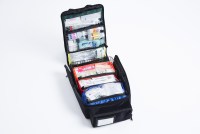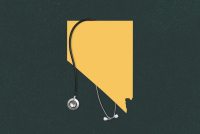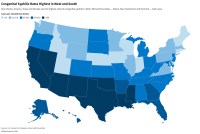Latest KFF Health News Stories
Millones en riesgo de perder Medicaid, mientras terminan protecciones por la pandemia
Los estados se están preparando para remover a millones de personas de Medicaid, a medida que expiran las protecciones que se implementaron al comienzo de la pandemia de covid-19.
As Pandemic-Era Medicaid Provisions Lapse, Millions Approach a Coverage Cliff
States are trying to reach millions of Medicaid enrollees to make sure those still eligible remain covered and help others find new health insurance.
After a Brief Pandemic Reprieve, Rural Workers Return to Life Without Paid Leave
Coastal and politically progressive states have passed stronger paid sick and family leave policies, but many workers in rural America are left out, facing tough decisions when choosing between caring for themselves or sick family members or keeping their jobs.
During In-Flight Emergencies, Sometimes Airlines’ Medical Kits Fall Short
U.S. airlines have response plans for passengers who run into health issues in flight, but planes carry limited and sometimes incomplete medical supplies that can put travelers at risk.
Mass Shootings Reopen the Debate Over Whether Crime Scene Photos Prompt Change or Trauma
After almost every mass shooting, a debate is renewed over whether to publish the photos of the carnage the guns have inflicted.
Mistrust and Polarization Steer Rural Governments to Reject Federal Public Health Funding
As the covid-19 pandemic grinds on, Elko County, Nevada, still lacks a public health department. Yet its elected leaders rejected federal funds that could have helped it create one. Decisions like the one in Elko, and ones made by officials with other state and local governments, leave health experts concerned about whether the country’s public health infrastructure will be prepared to handle future health challenges.
Hospital Giant HCA Fends Off Accusations of Questionable Inpatient Admissions
The nation’s largest private health system, HCA Healthcare, has faced years of scrutiny over its share of emergency room patients who are admitted to the hospital. And now U.S. Rep. Bill Pascrell, a Democrat from New Jersey, is calling for a federal investigation, prompting an escalating defense by the hospital system, based in Nashville, Tennessee.
Centene Showers Politicians With Millions as It Courts Contracts and Settles Overbilling Allegations
Centene, the largest Medicaid managed-care company in the U.S., has thrown more than $26.9 million at political campaigns across the country since 2015, especially focused on states where it is wooing Medicaid contracts and settling accusations that it overbilled taxpayers. Among its tactics: Centene is skirting contribution limits by giving to candidates through its many subsidiaries.
When Monkeypox Reaches Rural Communities, It Collides With Strained Public Health Systems
In Nevada, local health officials are assessing the threat of monkeypox, but their response may be hampered by historically limited public health infrastructure worn thin by the covid-19 pandemic.
El humo de los incendios forestales perjudica más la salud en lugares donde faltan especialistas
Los miembros de la tribu local y otros residentes de la zona se encuentran entre los millones de personas del país que este año experimentarán una mala calidad del aire debido a los incendios forestale
Climate Change Magnifies Health Impacts of Wildfire Smoke in Care Deserts
Smoke- and ash-filled air can trigger or exacerbate severe respiratory conditions. But the medical specialists who treat these illnesses are often scarce where they are most in need.
Shattered Dreams and Bills in the Millions: Losing a Baby in America
On top of fearing for their children’s lives, new parents of very fragile, very sick infants can face exorbitant hospital bills — even if they have insurance. Medical bills don’t go away if a child dies.
Journalists Delve Into Inflation Policy, Hospital Closures, and Needle Exchanges
KHN and California Healthline staff made the rounds on national and local media this week to discuss their stories. Here’s a collection of their appearances.
Hay más trasplantes de órganos, pero la agencia encargada de coordinarlos está en tela de juicio
Aproximadamente 5,000 pacientes al año mueren mientras están en lista de espera, al mismo tiempo que órganos donados en perfecto estado acaban en la basura.
Organ Transplants Are Up, but the Agency in Charge Is Under Fire
A two-year congressional investigation has identified troubling lapses in the nation’s organ transplant system. Blood types mismatched, diseased organs transplanted anyway, and — most often — organs lost or damaged before they can save a life.
A Needle Exchange Project Modeled on Urban Efforts Aims to Save Lives in Rural Nevada
Five years after HIV tore through a rural Indiana town as a result of widespread drug use, a syringe and needle exchange program was set up in rural Nevada to prevent a similar event.
Abortion Is Shaking Up Attorneys General Races and Exposing Limits to Their Powers
Abortion access is shaping races for legal office across the country, from local district attorneys to attorneys general. But it’s also highlighting the boundaries of their offices.
Music Festivals Embrace Overdose Reversal Drugs, but Fentanyl Testing Kits Remain Taboo
Music festival promoters are allowing distribution of overdose reversal medication as fentanyl deaths continue to surge. But nonprofits and volunteers are often left to do the work, and more controversial forms of harm reduction aren’t openly allowed.
Babies Die as Congenital Syphilis Continues a Decade-Long Surge Across the US
Congenital syphilis rates keep climbing, according to newly released federal data. But the primary funding source for most public health departments has been largely stagnant, its purchasing power dragged even lower by inflation.
‘The Danger Is Still There’ ― As Omicron Lurks, Native Americans Are Wary of Boosters
Federal data shows that vaccination rates for American Indians and Alaska Natives were some of the highest in the nation, but tribes say resistance has slowed efforts to boost members.























